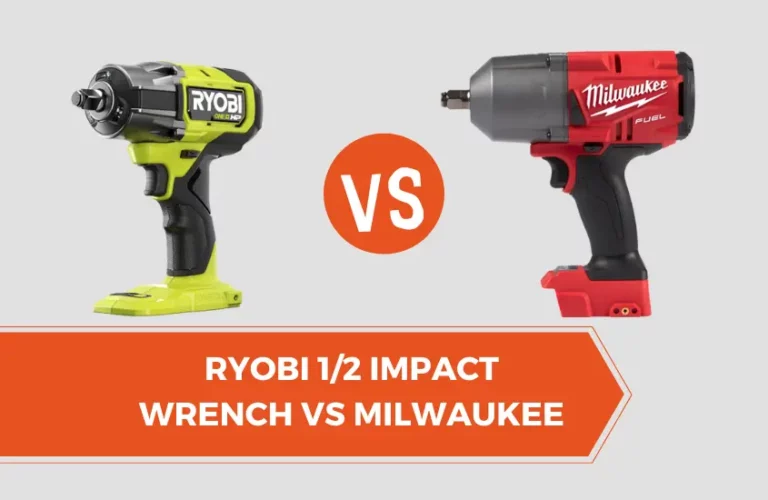
Ryobi 1/2 Impact Wrench vs Milwaukee: Who Stands the Top?
In the impact wrench industry, Ryobi and Milwaukee are two popular brands. However, people often get too confused when selecting between Ryobi 1/2 impact wrench vs Milwaukee because they have similarities in performance, motor, build quality, and compatibility.
Apart from these similarities, Ryobi and Milwaukee 1/2 impact wrenches have differences in torque level, IPM, price, and a few other areas. Additionally, Ryobi has a maximum of 2800 RPM, while Milwaukee produces a maximum of 1750 RPM.
If you’re not convinced enough to decide which 1/2 impact wrench is the best deal, I’d like to share a detailed comparison of their key specifications in today’s topic. Read on for more information!
Ryobi 1/2 Impact Wrench vs Milwaukee: Quick Comparison Chart
| Criteria | Ryobi Impact Wrench | Milwaukee Impact Wrench |
| RPM | 2800 Max | 1750 Max |
| Torque | Fastening: 450 ft-lbsBreakaway: 600 ft-lbs | Fastening: 1000 ft-lbsBreakaway: 1400 ft-lbs |
| IPM | 3200 | 2100 |
| Weight | 4.16 Pounds | 6.0 Pounds |
| Warranty | 3 Years | 5 Years |
| Cost | Inexpensive | Slightly Expensive |
Differences Between Ryobi 1/2 vs Milwaukee Impact Wrench
Despite being friendly with almost the same applications, Ryobi and Milwaukee may function differently due to their feature differences. And that’s what I want you to show you right away:
1. RPM
Rotations per minute stand for the approximate speed range of an impact wrench. Therefore, if the RPM on your power tool is higher, it will be able to generate more speed to deal with complex objects.
Regarding the Milwaukee 1/2 impact wrench, its maximum RPM ranges up to 1750. In contrast, the Ryobi 1/2 impact wrench has a maximum RPM of 2800, making it one step ahead of Milwaukee in terms of overall speed.
2. Torque Levels
The torque level on impact wrenches is of different types, from fastening to breakaway. Moreover, they offer a great impact on the overall performance of the wrench, depending on what project you’re dealing with.
Let’s start with Milwaukee. With a maximum 1400 ft-lbs breakaway torque, it features 1000 ft-lbs fastening torque for improved efficacy.
Whereas Ryobi 1/2 impact wrench comes with a breakaway torque level of 600 ft-lbs and fastening torque of 450 ft-lbs.
So here, you can easily detect the winner in the battle of torque levels!
3. IPM
IPM stands for “impacts per minute.” It refers to the approximate quantity of blows the wrench can make against rigid fasteners. So, the more IPM your impact wrench produces, the tougher your power tool is going to be against heavy-duty projects.
Considering this, it is crystal clear that the Ryobi 1/2 impact wrench stands out for the 3200 IPM that it produces, while Milwaukee can’t generate more than 2100 impacts per minute.
4. Item Weight
As users often have to keep holding the impact wrench for a prolonged period of time, it is common to consider the overall weight. And here, I guess none of them won’t let you down, ask why?
Simply because both Ryobi and Milwaukee 1/2 have added their names to the compact impact wrench category, meaning they both are lightweight. But compared to the Ryobi, Milwaukee seemed a little bit weighty to me!
5. Warranty
If an impact wrench offers an extended warranty, it’s a matter of relaxation! Even though the warranty duration varies from marketplace to marketplace, you can get a general idea from their official websites.
For instance, the Ryobi ½ impact wrench’s official website claims to offer a three-year limited warranty, while the Milwaukee’s official site delivers up to 5 years of long-term warranty.
6. Price
Price is the last thing to differentiate the Ryobi and Milwaukee impact wrenches. Despite staying almost neck-to-neck, the Ryobi 1/2 impact wrench is a little more affordable than the Milwaukee.
Although there are no significant differences in their price, still, Milwaukee is a bit steep.
Milwaukee 1/2 Impact Wrench vs Ryobi: Which One Should You Pick?
After digging into their comparison, are you still finding it tough to decide which deserves the spot in your arsenal? Well, it is a matter of priority because none of them is best in every aspect. In fact, each has its own limitations, pros, and cons!
Let’s say Milwaukee is definitely a good pick for those who prefer ultra-level torques. Besides, its 5 years of extended warranty can keep you out of stress for a long, although this makes it slightly expensive. Plus, its LED light may start blinking at times!
In that case, if you’ve issues with the budget yet want to enjoy greater IPM, RPM, and portability, go with the Ryobi without thinking twice!
